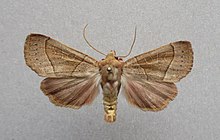The pale stigma (Mesogona acetosellae) is a moth of the family Noctuidae. It is found in central and southern Europe, Turkey, the Caucasus, Armenia, Kazakhstan and from western Siberia to the Altai.
| Mesogona acetosellae | |
|---|---|

| |
| Scientific classification | |
| Domain: | Eukaryota |
| Kingdom: | Animalia |
| Phylum: | Arthropoda |
| Class: | Insecta |
| Order: | Lepidoptera |
| Superfamily: | Noctuoidea |
| Family: | Noctuidae |
| Genus: | Mesogona |
| Species: | M. acetosellae
|
| Binomial name | |
| Mesogona acetosellae (Denis & Schiffermüller, 1775)
| |
| Synonyms | |
| |
Description edit
The wingspan is 40–44 mm. Forewing greyish ochreous, flushed with brownish or rufous, and with dark irroration; lines pale with dark edging, approximating on inner margin; upper stigmata large with pale outlines: a submarginal row of dark spots between the veins; hindwing greyish ochreous, paler towards base: palpi pink, abdomen ochraceous. The form found in Siberia, eremicola Stgr, is paler, but covered with black striations. Larva dull flesh colour, dusted with black: dorsal line dull ochreous; head and thoracic plate brown.[1]
Biology edit
Adults are on wing from August to September depending on the location. There is one generation per year.
The larvae feed on Prunus spinosa, Quercus, Crataegus and Populus species.
Subspecies edit
- Mesogona acetosellae acetosellae
- Mesogona acetosellae anatolica (Turkey)
References edit
- ^ Warren. W. in Seitz, A. Ed., 1914 Die Großschmetterlinge der Erde, Verlag Alfred Kernen, Stuttgart Band 3: Abt. 1, Die Großschmetterlinge des palaearktischen Faunengebietes, Die palaearktischen eulenartigen Nachtfalter, 1914
External links edit